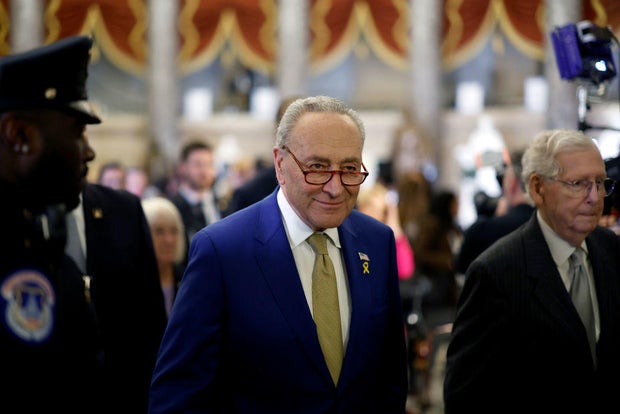Washington — The Senate is on track to pass a six-bill package on Friday to fund parts of the federal government through September and avoid a partial shutdown that is set to take effect at the end of the week.
Senate Majority Leader Chuck Schumer, a New York Democrat, said Wednesday the upper chamber would move quickly in sending the package to President Biden “with time to spare before Friday’s deadline.”
The House passed the package Wednesday, with Democrats providing a majority of the votes needed to get it over the finish line. Conservatives held firm in their opposition to all of the recent funding extensions that lacked their preferred spending cuts and policy riders.
The latest measure to keep the government operating covers agriculture, energy and the environment, housing, transportation, veterans and the Justice Department through the end of the fiscal year on Sept. 30.
Congress has another two weeks, until March 22, to pass the six remaining spending bills to fully fund the government for the same timeframe. But getting the second package — which includes funding for the Defense, State and Homeland Security departments — through Congress is expected to be more contentious.
Ting Shen/Bloomberg via Getty Images
If lawmakers can get over that hurdle, it would resolve a spending fight that has repeatedly pushed the government to the brink of a shutdown since last fall, and allow Congress to shift its focus to approving next year’s appropriations bills.
“We are on target and on track to meet that deadline,” Connecticut Rep. Rosa DeLauro, the top Democrat on the House Appropriations Committee, said Wednesday of the March 22 deadline.
DeLauro said the bills “are in various stages of progress.”
The current six-bill package includes cuts to the FBI, the Environmental Protection Agency and the Bureau of Alcohol, Tobacco, Firearms and Explosives, which were celebrated by House Speaker Mike Johnson, a Louisiana Republican. But the conservative House Freedom Caucus said it “punts on nearly every single Republican policy priority.”
Democrats were able to fend off restrictions on abortion access sought by Republicans and secured investments in infrastructure and programs for veterans, while also fully funding a nutrition program for low-income women, infants and children, known as WIC.
